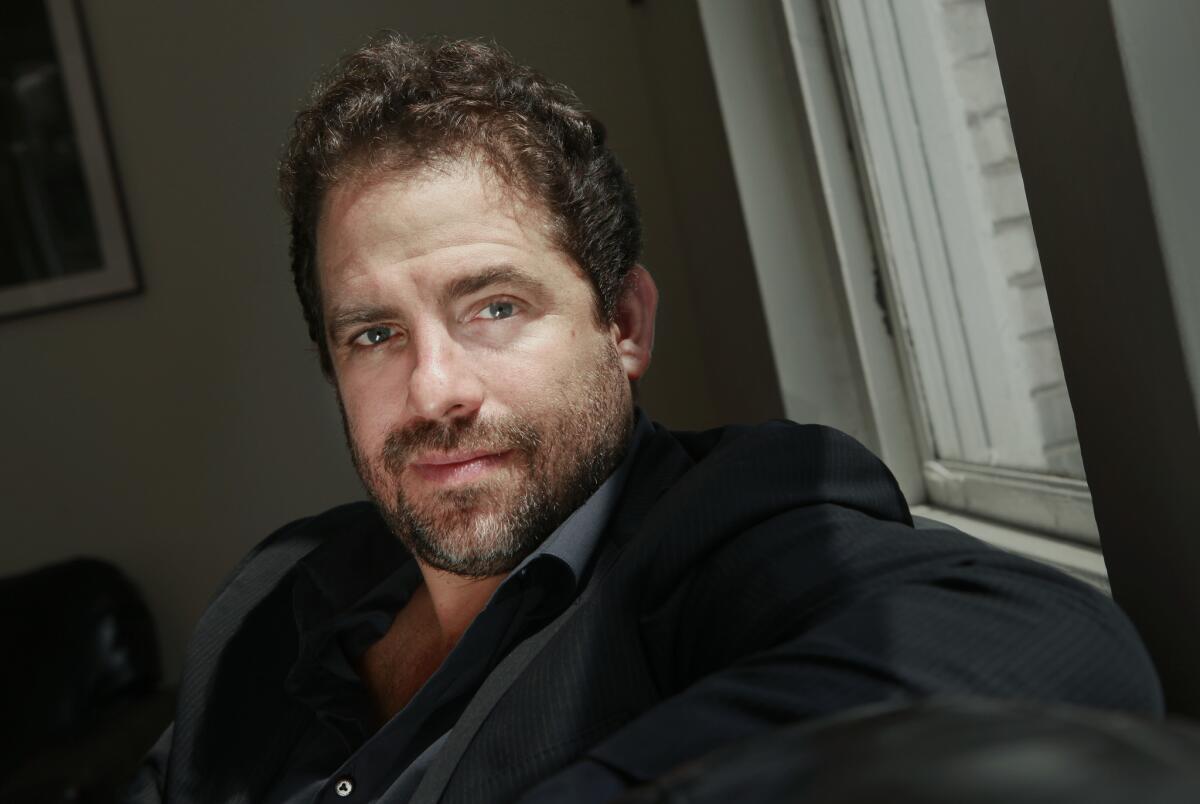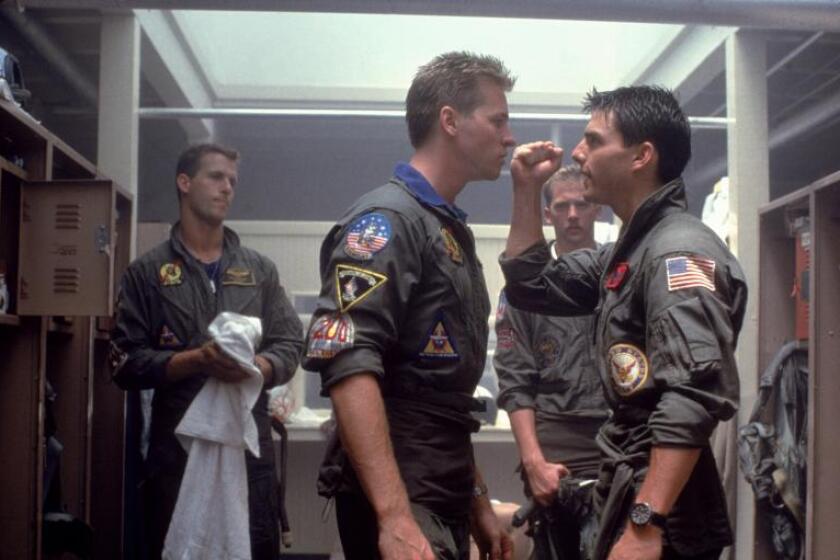Who’s next? High anxiety in Hollywood
- Share via
The curtain has been pulled back, and, oh, is it messy.
Hollywood has always reveled in scandal. The rumor. The whisper. The unfortunate photograph. The apology and return to grace. But the recent sex abuse stories have turned into a parade of tawdry violations and twisted passions, the stuff of movies acted out in real lives against the unglamorous air of disgrace, endless transgressions that even Ray Donovan, Showtime’s half-shaven mercurial fixer, couldn’t clean up with all his hush money and muscle.
The rape and sexual abuse allegations surrounding Harvey Weinstein, Brett Ratner, James Toback and others have shattered the awards-season aplomb in a town that imagines itself bold and freewheeling but prefers the tempered and scripted. The entertainment industry has slipped into a multi-polar catharsis of emboldened women, nervous men, threatening lawyers, broken deals, spoiled careers and the uncertainty that comes when cracks run like lightning through facades.
“I think the industry is forever changed,” said Marcel Pariseau, a publicist whose clients include Scarlett Johansson and Olivia Munn, one of six women who accused Ratner of sexual misconduct in The Times last week. “Every morning we wake up and we don’t know what’s going to be next. You’re almost afraid to get on your gadget to see what the new story is.
“No one is going to be going to a producer or director’s hotel suite anymore,” he added. “All meetings will be done with somebody else in the room for protection for both sides. It’s a defining moment. It’s vigilance.”
Instagram accounts are being scrubbed, Facebook pages edited, publicists consulted and memories jogged about what might have happened where and with whom on that blurry night years ago. The cocktail circuit is jittery; the Oscar buzz feels a bit listless. Talent agencies are dropping clients and scouring their own houses. Studios are pruning relationships, firing executives hours after an allegation is made public.
Full Coverage: Harvey Weinstein sexual harassment scandal »
In every pitch or development meeting, “people want to talk about it,” said a female television writer who preferred to remain anonymous. “It’s like everyone needs a little bit of therapy. It’s preoccupying people’s minds because they either have a direct connection to it or it’s like driving by a car crash; you’re just riveted. In the way Trump stuff used to lead a lot of things, now this stuff leads every single sit-down.”
This is the new Hollywood. Restless, unsure, demanding justice, looking for cover and wondering how to move beyond a long history of discrimination and sexual harassment and toward the kind of enlightened world it so often supposes in its art.
“We’re all having a conversation now about whether or not we are protecting people in our industry from people committing violent crimes against them,” said comedian and producer Judd Apatow. “I personally would not be comfortable making it a big part of my business trying to keep rapists and people who commit sexual assaults on the street. We all decide how we want to make money. We all decide what’s ethical. I’m well aware that all criminals deserve representation, but at the same time sometimes we’re putting other people in danger.”
It’s hard to fix things when even hallowed names are in the headlines: Dustin Hoffman has apologized after being accused of sexually harassing a 17-year-old intern in 1985. Kevin Spacey said he was seeking “evaluation and treatment” after allegations of sexual assault and harassment.
The consequences against the accused have been swift: Netflix canceled Spacey’s “House of Cards” and Warner Brothers cut ties with Ratner, who has denied claims of sexual harassment and misconduct from a number of women.
Every morning we wake up and we don’t know what’s going to be next. You’re almost afraid to get on your gadget to see what the new story is.
— Marcel Pariseau, publicist
“When the Dustin Hoffman thing broke I was like, my gosh, now there’s going to be a library of great movies that I can’t watch anymore because of the ick factor. The ick factor is real,” said the TV writer.
Audiences and critics have already begun reevaluating Weinstein’s films, many of which were nominated for and won Academy Awards, including “Shakespeare in Love,” whose star Gwyneth Paltrow says that the producer assaulted her in a hotel suite when she was 22.
Many women are by turns horrified and relieved; a number of actresses believe the accusations are forcing the industry to finally police itself, and to realize the dangers of an entrenched “boys club.” To end this culture, Ellen Barkin tweeted: “I call upon fierce, more powerful sisters in our biz to bring women who’ve come forward into ur circle.”
The fissures rattling through town “have been a long time coming,” said Jordana Oberman, an actress and producer. “The industry has been complicit in this type of behavior and chalked it up to Hollywood. A lot of us are hoping this is a defining moment, but only time will tell. My hope is that there’s a bigger examination of the complicity and that people won’t shut up anymore.”
The raised fist of Rose McGowan, who says she was raped by Weinstein, and worries of Woody Allen, who cautions against a “witch hunt,” are the opposite ends of this unsettling expanse. The scandals strike at the core of this town’s power — who has it, how they wield it — and follow years of complaints over racism and discrimination that culminated in the #OscarsSoWhite campaign and then, many believe, had a part in handing this year’s Best Picture Academy Award to “Moonlight,” a gay coming-of-age story by a black director and cast.
But the back-slapping lasted only months.This is, after all, Hollywood in the age of President Trump, a reality show host who crystallized the marriage of celebrity and politics, and a candidate who admitted to groping women only to land in the White House. The entertainment industry railed at Trump but the allegations against Weinstein, Ratner and others suggest a long pattern of abuse perpetrated by men who considered themselves artists and liberals.
“When I started in this business in my 20s, there was a pervasive feeling that rich, powerful men in any business could do what they wanted — and that’s just the way it was,” producer Christine Vachon, whose credits include “Carol,” “Still Alice” and “Boys Don’t Cry,” recently told The Times.“It was baked into our lives.”

Trump’s ascent and the cascade of Hollywood allegations have refocused the feminist movement at a time women increasingly feel their rights are endangered. The hundreds of women who have come forward in the entertainment industry span an arc from top-tier actresses to office assistants. Their allegations fed into and spurred wider calls against abuse across the country. Social media — from #MeToo on Twitter to endless Facebook pages — have become constant pre-occupations in the city, modern-day town criers that not only alert women to the latest infractions but also provide a reframing of previously tolerated behavior.
“Whether it is conversations I’ve had with writers, or just the general vibe, there’s a genuine respect and admiration for the women who have come forward to speak out against this,” said John Eisendrath, a television writer and executive producer of “The Blacklist.” “Like every guy, and I am certain I am no exception, I have gone over in my mind the 30 years I have worked in this business. Have I seen it? Was I exposed to it? Did I ignore it? Did I not do enough in situations?”
Alec Baldwin says the culture of the town has changed and there may be backlash and recrimination.
“At least for a considerable amount of time in the future, you will almost never see an unchaperoned casting session again. Ever,” he said. “Everybody’s going to want to have somebody in the room with them to make sure nothing questionable is going to happen.”
He added: “My agent contacted me and said that they’re concerned that people who are quiet are going to lose work as a result of this. Because they’re going to find some photograph of you with [someone who has] been accused of something untoward, and I just hope people proceed with this very carefully.”
The day-to-day “zeitgeist is there’s an awareness in the way people should be treated that is now a part of everyone’s consciousness,” said Eisendrath. “That is the headline.”
The sexual accusations have also led to debate about legal questions and moral equations over who should protect whom amid criminal investigations, civil suits and negotiated settlements. All this for years has been part of the complex machinery that has threatened, toppled and saved careers in a crucible where bluster is an art form and image is paramount.
Nathanael West, F. Scott Fitzgerald and Raymond Chandler were intrigued, enchanted and often un-romantic about this town, its egos and insecurities, its strivers and connivers. They knew of scandal, and saw Los Angeles and Hollywood as neighborhoods and private lives reaching into one another and stretching through canyons toward the ocean, on and on, like the flash and tremor of a dream. But lurking beneath, somewhere deep in the earth, a fault slips into a brokenness waiting to rise. Nobody knows where or when it will strike.
“It’s a difficult time to navigate this,” said Amanda Lenker Doyle, a casting director. “It’s horrible stuff to hear and talk about every day. I certainly hope it will change the industry going forward.”
Times staff writer Glenn Whipp contributed to this report.
See the most-read stories this hour »
Twitter: @JeffreyLAT
More to Read
Only good movies
Get the Indie Focus newsletter, Mark Olsen's weekly guide to the world of cinema.
You may occasionally receive promotional content from the Los Angeles Times.











